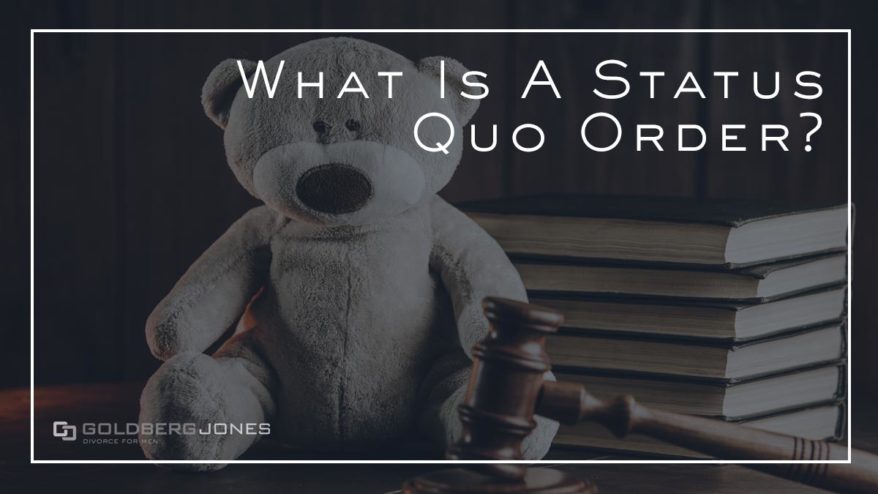During divorce and breakups, child custody battles often become heated and contentious affairs. In some situations in Oregon, the court issues temporary orders lasting the duration of a case. This may include temporary custody arrangements or even implement temporary child support.
Some divorces and separations start with one parent taking the kids from the other, pulling them out of school, hiding them, and the like. If you’re trying to keep a child’s living situation and routine in place, a status quo order may be in order.
A status quo order can serve almost as an effective, inexpensive, “light duty” custody order.
What Is A Status Quo Order?
A Latin term, status quo means “the existing state of affairs, the way things are.”
In a legal setting, judges use a status quo order—also called a temporary protective order of custody and restraint—to maintain a situation. This prevents parties involved from affecting change until the matter at hand is resolved.
When it comes to family law cases, like divorce and child custody matters, these manifest in a number of ways. Once in place, until further judgment arrives, they preserve the living arrangement, parenting time, and maintenance support.
These orders are designed to protect minor children during the legal process. In custody situations, the child’s health, safety, and well-being take precedence over other concerns.
A status quo order may prevent one parent from taking the child from a home or area without the other’s consent.
Once issued, this decree stays in place until the parents agree on a parenting plan or the court issues custody orders.
Related Reading: Writ of Assistance, Custody, and Divorce
How This Applies to Family Law
Oregon courts have the power to issue a status quo order at the outset of the legal process.
In a practical sense, they prevent each parent from doing six specific things:
- Changing the child’s usual place of residence;
- Interfering with the child’s present placement and daily schedule;
- Hiding or secreting the child from the other party;
- Interfering with the other party’s usual contact and parenting time with the child;
- Leaving the state with the child without the written permission of the other party or the court;
- Or in any manner disturbing the child’s current schedule and daily routine until custody or parenting time has been determined.
Related Reading: Child Custody in Oregon
Objecting To A Status Quo Order
A status quo order takes into account parenting time, custody, and school location for the three months prior to the request. But what if you object to the status quo as laid out in the status quo order?
For example, your ex serves you with a status quo order saying she doesn’t want to upset your daughter’s routine and that she has custody five days a week, but that’s never been the case.
Fortunately, you can raise objections to how the status quo is portrayed.
As with most legal matters, you must prove your claims. You need to provide your own version to help solidify your assertion in this area. Document as much evidence as you can and have reliable witnesses you can call to back up your side of the story.
Related Reading: Parental Evaluations In Oregon
Immediacy Of the Order
One of the big benefits of a status quo order is the immediacy.
You or any party served with a status quo order has the right to request a hearing. In Oregon, the courts must make a reasonable effort to schedule the hearing within 14 days. At the outside, a hearing must take place no later than 21 days after the court receives the request.
While this doesn’t award custody, it does cut the legs out of a bad actor. You go to court almost immediately. Without a status quo order, you often have to wait 30 to 60 days, or longer depending on the county, for a temporary order hearing.
Like temporary protection measures, the intent of a status quo order is to further a child’s best interests. This can be to protect them from potential harm, as in situations of abuse or neglect, or to ensure stability during a tumultuous time.
As with most legal matters, there are many boxes to check off and things can get complicated in a hurry. Whichever side you fall on, you must substantiate your position and provide proof of your claims.
Improper use of such orders can have an impact down the road. It may influence the final decision from the court, impact the ultimate parenting plan, or you may even have to pay your ex’s attorney fees.
Related Reading: Child Custody Enforcement Proceedings

Comments 2
I filed for custody. My ex filed and was granted temporary custody per a status quo. I’m going to file for a hearing to dispute it. In the meantime, if he shows up at my house or anything else with the police and the status quo paper… Do I have to immediately hand her over? What are my rights? How much time do I have before it goes into effect?
Author
Hi Crissy,
Thanks for reaching out. That’s a tough situation. I passed your contacts and the details of your case along to our managing attorney, Colin Amos. He will reach out to you shortly with more information about your options. In the meantime, feel free to give us a call at (503) 731-8888.